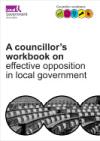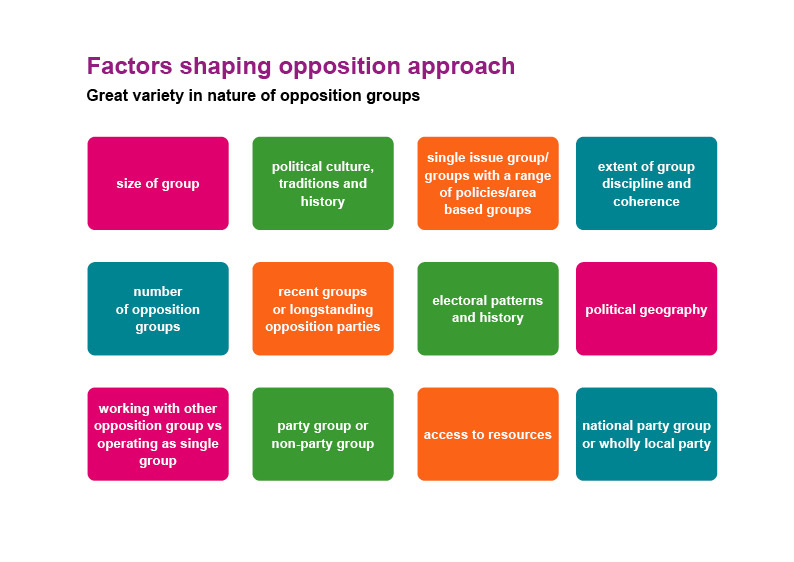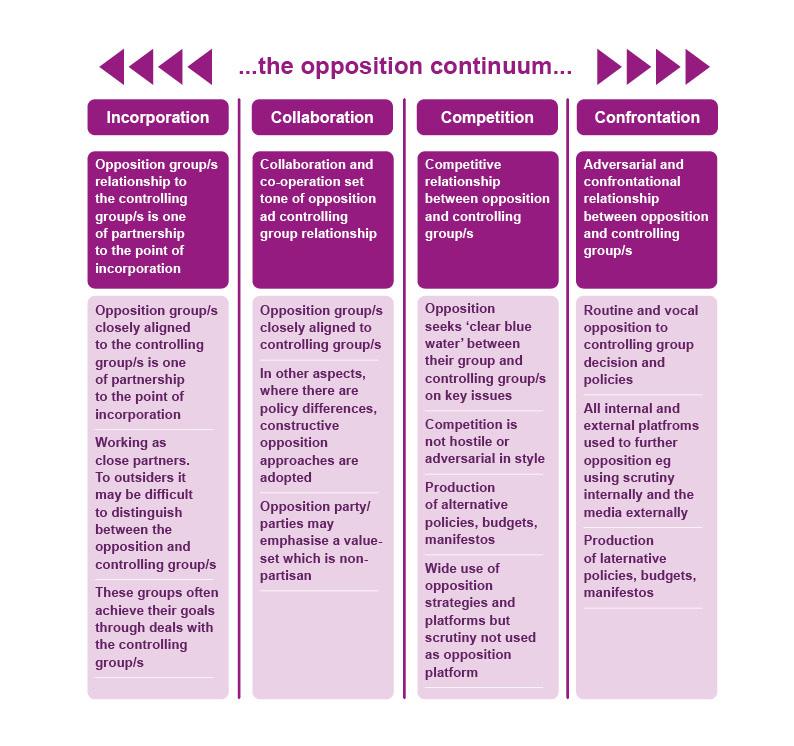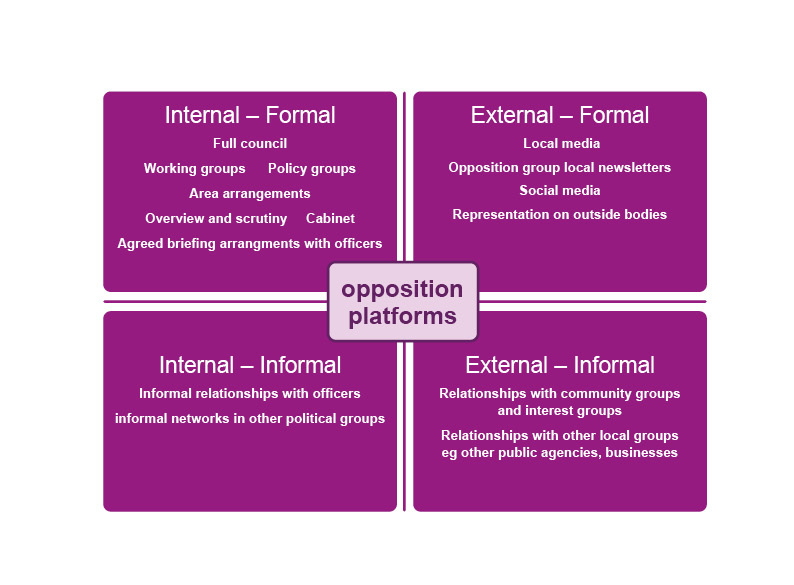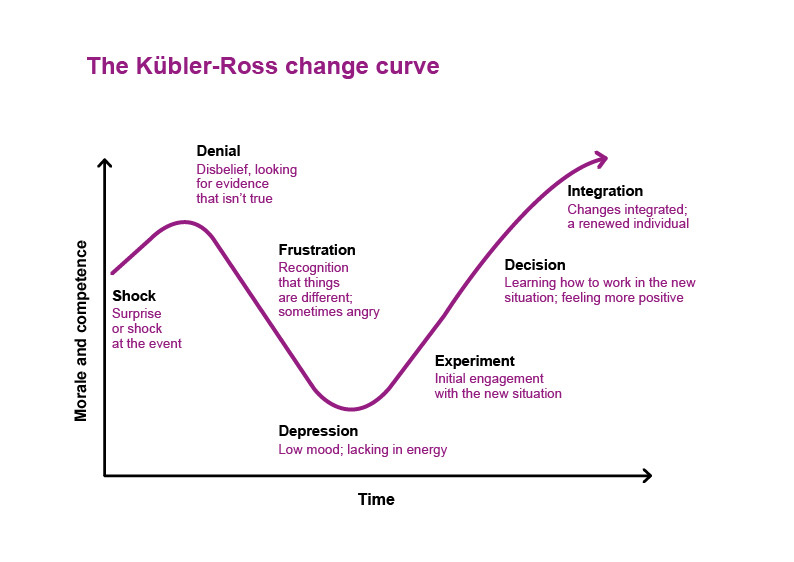There are many skills which support effective opposition working. Skills can be simply defined as ‘things you need to be good at.’ These apply to leaders of opposition groups, deputies and generally to all opposition councillors. The skills range from leadership, influencing and persuasion, intentional relationship building and networking; to effective communication and working well with the media, understanding the policy making process, analytical, questioning skills which produce effective challenge; and the ability to advocate, negotiate, build strong teams and work well within them and use advanced political skills.
Skills for effective opposition
| Leadership |
Analytical |
| Influencing |
Questioning |
| Relationship building |
Advocacy |
| Communication |
Negotiation |
| Media |
Team building and working |
| Policy making |
Political skills |
Some council role descriptions for opposition leaders go further than a description of necessary skills, listing useful knowledge and/or relevant experience for the role. Kirklees’ role profile includes eleven areas of knowledge useful for opposition leaders in addition to skills. South Holland’s person specification for the leader of the opposition includes a mix of skills and knowledge requirements.
Challenge 11: Skills audit
This is an exercise you can either undertake on your own or it can take the form of a skills audit for a whole group.
Option 1: On your own
Consider the opposition skills set out in this workbook.
- Which skills are your strengths?
- Which skills are you less comfortable with? Which require more development?
- What actions would you take based on this self-assessment?
Option 2: The whole opposition group
Consider the spread of skills within your opposition group.
- Which skills are well represented in the group?
- Which individuals have advanced levels of certain skills?
- Which skills are poorly represented in the group?
- Would mentoring or training help develop individuals in the group or help with skills which are generally under-represented?
- What actions could we prioritise?
Developing political skills
Opposition groups will be more effective if they have advanced political skills. It could be argued that given the complexities of the opposition role and the inability to ‘command and control’ that political nous is of greater importance for the opposition than ruling groups. There tends to be an assumption that councillors will excellent political skills just by virtue of being elected. In reality political skills often have to be developed through experience – but they can also be developed through undertaking training and//or being mentored or coached. A good self-reflection question to ask is, ‘how developed are my political skills?’ and, ‘how well developed are the political skills of my opposition group?’
There are a number of frameworks which can be used to help identify and develop political skills. It can be useful to consider the Four Levels of Political Skills summarised below. The first level – the knowledge level – is being able to identify the political landscape. This involves being able to identify the different arenas and platforms where politics plays a part. This would include the governance arrangements in your council, the political groups, and the nature of the political geography (i.e., the political balance in different geographic areas). The second level involves moving beyond this knowledge to analysis – from knowledge to understanding – and involves understanding how power is distributed and being able to identify the key decision-makers and influencers.
The four levels of political skills, developed by Dr Stephanie Snape, New Leadership Foundation, 2023.
| Level |
Summary |
| Level 1 Knowledge |
Identifying the political landscape – the governance arrangements, political groups, political geography |
| Level 2 Analysis |
Analysing the political landscape – understanding how the system works and who the key players are |
| Level 3 Alliance building |
Establishing networks and forming alliances |
| Level 4 Achieving outcomes |
Bargaining and negotiating to achieve outcomes |
The third level uses the understanding gained in level 2 to develop personal networks, forming strategic alliances through intentional relationship building. The fourth level involves using your political skills in alliance building to achieve your political objectives and achieving desired outcomes. As you move up the levels, you develop your own power and influence.
A simple self-reflection exercise based on the four levels would ask, ‘where are you on the four levels?’ and ‘what level is our opposition group on generally?’
Political Astuteness Framework
The Political Astuteness Framework also seeks to set out the nature of political skills. The framework was produced to describe the political skills required for senior officers and managers in public services, but it is equally useful for politicians. The framework sets out five groupings of skills and competencies which really highlight the deftness and advanced level of skills useful in local politics.
Political astuteness framework: A self-reflection approach for local politicians
| Skills |
More details |
Self-reflection |
| Personal skills |
- Self-awareness
- Listening to others
- Curious about other views
|
Are your skills in this area: under-developed, developing, or advanced?
When have you used these skills?
How could you use them?
What actions could you take to improve your skills?
|
| Interpersonal |
- ‘Soft’ skills: influencing others, getting buy-in, making people feel valued
- ‘Tough’ skills: ability to negotiate, handling conflict, withstanding pressure, coaching and mentoring others
|
| Reading people and situations |
- understanding power relationships
- recognising different interests and agendas
- discerning underlying agendas
- thinking through likely standpoints of various interests
|
| Building alignment and alliances |
- actively seeks out alliances and partnerships
- works with differences and conflicts of interest
- recognises difference and forges collaborative action
- knows when to exclude particular interests
|
| Strategic direction |
- strategic thinking – thinking long term and having a road map of the journey
- not diverted by short term pressures
- horizon scanning – attention to what is over the horizon
- thinking through possible future scenarios
- alert to emerging trends and patterns
- analysing and managing uncertainty
- keeping options open – not taking decisions prematurely
|
Source: Open University, Dancing on Ice, 2013. Adapted by Dr Stephanie Snape, 2023.

